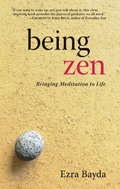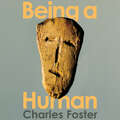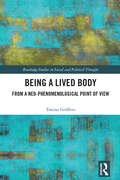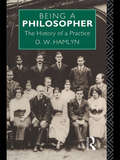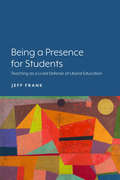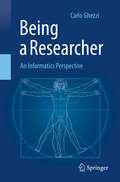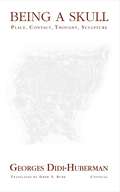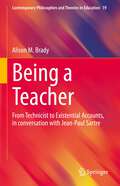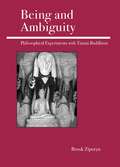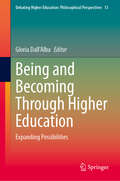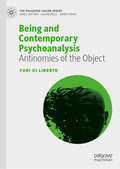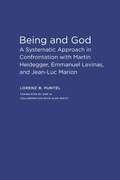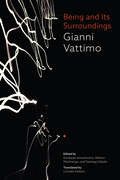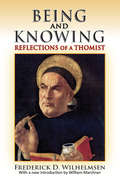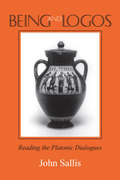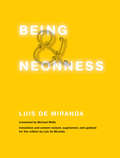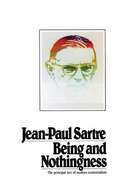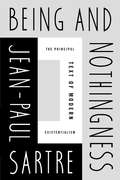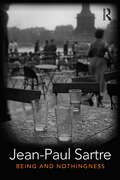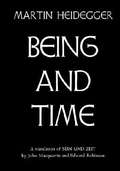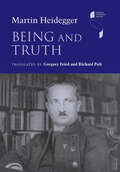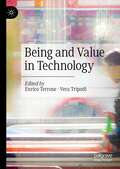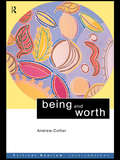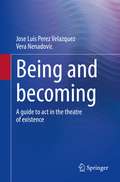- Table View
- List View
Being Zen: Bringing Meditation to Life
by Charlotte Joko Beck Ezra BaydaWe can use whatever life presents, Ezra Bayda teaches, to strengthen our spiritual practice--including the turmoil of daily life. What we need is the willingness to just be with our experiences--whether they are painful or pleasing--opening ourselves to the reality of our lives without trying to fix or change anything. But doing this requires that we confront our most deeply rooted fears and assumptions in order to gradually become free of the constrictions and suffering they create. Then we can awaken to the loving-kindness that is at the heart of our being. While many books aspire to bring meditation into everyday experience, Being Zen gives us practical ways to actually do it, introducing techniques that enable the reader to foster qualities essential to continued spiritual awakening. Topics include how to cultivate: * Perseverance: staying with anger, fear, and other distressing emotions. * Stillness: abiding with chaotic experiences without becoming overwhelmed. * Clarity: seeing through the conditioned beliefs and fears that "run" us. * Direct experience: encountering the physical reality of the present moment--even when that moment is exactly where we don't want to be. Like Pema Chödrön, the best-selling author of When Things Fall Apart, Ezra Bayda writes with clear, heartfelt simplicity, using his own life stories to illustrate the teachings in an immediate and accessible way that will appeal to a broad spectrum of readers. " Ezra Bayda teaches at Zen Center San Diego. He is also the author of Being Zen, At Home in the Muddy Water, Saying Yes to Life (Even the Hard Parts), and Zen Heart. For more information, visit www.zencentersandiego.org. ""Bayda writes with exceptional clarity and simplicity about the awakened life. He has a gift for describing 'ordinary mind,' or the customary thoughts, feelings, and experiences of everyday life. His style is as plainspoken as Pema Chödrön's. He deserves membership in the ranks of respected meditation teacher-authors."--Publishers Weekly "With clarity and compassion, Bayda applies Zen Buddhist principles to everyday life. He explains how all experiences, both pleasant and unpleasant, help us to discover our 'path' to wisdom and an open heart. Presented here are realistic suggestions to help us survive the journey."--Library Journal "Ezra Bayda wisely translates the Eastern spiritual belief into an extremely useful handbook for practice. Being Zen is humble and direct, which reminds me most of Shunryu Suzuki's Zen Mind, Beginner's Mind. It is what its title states--not an explanation of Buddhism or Zen, but an essential guide to its daily practice. Bayda's is a gentle, sharing voice that evenly embraces humor and sincerity, bringing reason and heart-sense to our most irrational behaviors."--Parabola "A skillful wedding of mindfulness and Zen--straightforward, simple, and wise."--Jack Kornfield, author of A Path with Heart and After the Ecstasy, the Laundry
Being a Human: Adventures in 40,000 Years of Consciousness
by Charles FosterA New Statesman Essential Non-Fiction Book of 2021What kind of creature is a human? If we don't know what we are, how can we know how to act? In Being a Human Charles Foster sets out to understand what a human is, inhabiting the sensory worlds of humans at three pivotal moments in our history. Foster begins his quest in a wood in Derbyshire with his son, shivering, starving and hunting, trying to find a way of experiencing the world that recognises the deep expanse of time when we understood ourselves as hunter-gatherers, indivisible from the nonhuman world, and when modern consciousness was first ignited. From there he travels to the Neolithic, when we tamed animals, plants and ourselves, to a way of being defined by walls, fences, farms, sky gods and slaughterhouses, and finally to the rarefied world of the Enlightenment, when we decided that the universe was a machineand we were soulless cogs within it.
Being a Lived Body: From a Neo-phenomenological Point of View (Routledge Studies in Social and Political Thought)
by Tonino GrifferoThis book begins with the distinction between the so-called lived body or felt body (Leib) and the physical body (Körper), tracing the conceptual history of this distinction through key figures in philosophical and social thoughts and articulating a theory of the lived body that draws on the New Phenomenology developed by Hermann Schmitz. An explanation of our being-in-the-world in terms of a felt-bodily communication with all perceived forms and their affective-bodily resonance in us, Being a Lived Body integrates and critically assesses the leading theories of embodiment while presenting a new approach to the body. It will, therefore, appeal to scholars of philosophy, social theory, and anthropology with interests in phenomenology and embodiment.
Being a Philosopher: The History of a Practice
by David W. HamlynFirst Published in 2004. Routledge is an imprint of Taylor & Francis, an informa company.
Being a Presence for Students: Teaching as a Lived Defense of Liberal Education
by Jeff FrankThis book offers a lived defense of liberal education. How does a college professor, on a daily basis, help students feel the value of liberal education and get the most from that education? We answer this question, as professors, each day in the classroom. John William Miller, a philosophy professor at Williams College from 1924-1960 and someone noted for his exceptional teaching, developed one form that this lived defense can take. Though Miller published very little while he was alive, the archives at Williams College hold unpublished notes and essays of this master teacher. In this book, Jeff Frank offers an extended commentary on one of these unpublished essays where Miller develops his thinking on liberal education. Frank develops the idea that presence is central to liberal education and offers suggestions for how professors can become an educative presence for students. The goal of this book is an invitation to other professors who value liberal education to think with Miller about how to develop their own lived defense of liberal education, each day, in their own classrooms. The tone of the book is meant to be invitational, at times even conversational, and the book concludes with some direct suggestions for how professors can live their own defense of liberal education.
Being a Researcher: An Informatics Perspective
by Carlo GhezziThis book explores research from the researchers’ perspective: why to engage in research, what methods to follow, how to operate in daily life, what the responsibilities are, how to engage with society, and the ethical issues confronting professionals in their day-to-day research. The book systematically discusses what every student should be told when entering academic or industrial research so that they can avoid going through the painful process of learning by personal experience and lots of errors. Rather than being technical, it is philosophical and sometimes even anecdotal, combining factual information and commonly accepted knowledge on research and its methods, while at the same time clearly distinguishing between objective and factual concepts and data, and subjective considerations. The book is about scientific research in general and as such holds true for any scientific field. However, it is fair to say that the different fields differ in their research cultures and in their eco-systems. The book reflects the author’s experience accumulated over almost 50 years of teaching graduate courses and lecturing in doctoral symposia at Politecnico di Milano, University of Zurich, TU Wien, Peking University, and at various conferences, and of academic research in informatics (also known as computer science). This book is mainly intended for students who are considering research as a possible career option; for in-progress researchers who have entered doctoral programs; and for junior postdoctoral researchers. It will also appeal to senior researchers involved in mentoring students and junior researchers.
Being a Skull: Site, Contact, Thought, Sculpture (Univocal)
by Georges Didi-HubermanWhat would a sculpture look like that has as its task to touch thought? For the French philosopher and Art Historian, Georges Didi-Huberman, this is the central question that permeates throughout the work of Italian artist Giuseppe Penone. Through a careful study of Penone&’s work regarding a sculptural and haptic process of contact with place, thought, and artistic practice, Didi-Huberman takes the reader on a journey through various modes of thinking by way of being. Taking Penone&’s artwork &“Being the river&” as a thematic starting point, Didi-Huberman sketches a sweeping view of how artists through the centuries have worked with conceptions of the skull, that is, the mind, and ruminates on where thought is indeed located. From Leonardo da Vinci to Albrecht Dürer, Didi-Huberman guides us to the work of Penone and from there, into the attempts of a sculptor whose works strives to touch thought. What we uncover is a sculptor whose work becomes a series of traces of the site of thought. Attempting to trace, by way of a series of frottages, reports, and developments, this imperceptible zone of contact. The result is a kind of fossil of the brain: the site of thought, namely, the site for getting lost and for disproving space. Sculpting at the same time what inhabits as well as what incorporates us.
Being a Teacher: From Technicist to Existential Accounts, in conversation with Jean-Paul Sartre (Contemporary Philosophies and Theories in Education #19)
by Alison M. BradyThis book re-conceptualizes teaching through an engagement with Jean-Paul Sartre’s early existentialist thought. Against the grain of teacher accountability, it turns to the demanding account of being human in Sartre’s thought, on the basis of which an alternative account of teaching can be developed. It builds upon Sartre’s key concepts related to the self, freedom, bad faith, and the Other, such that they might open up original ways of thinking about the practices of teaching. Indeed, given the everyday complexities that characterize teaching, as well as the vulnerabilities and uncertainty that it so often involves, this book ultimately aims to create a space in which to reimagine forms of accounting that move from technicist ways of thinking to existential sensitivity in relation to one’s practice as a teacher.
Being and Ambiguity: Philosophical Experiments with Tiantai Buddhism
by Brook ZiporynBeing and Ambiguity is a brilliant work of philosophy, filled with insights, jokes, and topical examples. <P><P>Professor Ziporyn draws on the works of such Western thinkers as Wittgenstein, Nietzsche, Freud, Sartre, and Hegel, but develops his main argument from Tiantai school of Chinese Buddhism. This important work introduces Tiantai Buddhism to the reader and demonstrates its relevance to profound philosophical issues.Ziporyn argues that we can make both of the claims below simultaneously:This book is about everything. It contains the answers to all philosophical problems which ever shall exist. This book is all claptrap. It is completely devoid of objective validity of any kind.These claims are not contradictory. Rather, they state the same thing in two different ways. To be objective truth is to be subjective claptrap, and vise versa. All interchanges of any kind - conversations, daydreams, sensations - are not only about something but also about everything.Thus, this book concerns itself with no less than the nature of what is and what it means for something to be what it is. It provides a new approach to the basic Western philosophical and psychological issues of identity, determinacy, being, desire, boredom, addiction, love and truth.ems identified, investigated, and resolved-resolved at least in a manner that measures up to the title: Being and Amibguity. But whether it's being or non-being that bothers you, this book has your number, your 'social security' number to be exact, since one of the subtle charms (terrors?) of this book is its commitment to drive philosophy through the carwash of mundane reality, soaking the big German/Buddhist topics in the hot-again-cold-again Real of being-for-the-Other, and the numberless other harrowing tasks that normal life requires. A must read for anyone interested in metaphysical sodomy."-Alan Cole, Author of Text as Father: Paternal Seductions in Early Mahayana Buddhist Literature"Ziporyn carries out an audacious though experiment whose starting point lies in the classical Tiantai idea that being is fundamentally ambiguous. If this idea is valid, he argues, then no philosophical statement can be profound without being vapid. Fully embracing this implication, Ziporyn leads the reader on a fascinating adventure in which Kant, Hegel, Nietzsche, Freud, Heidegger, and many others are seen through the lens of Neo-Tiantai ethics."-Andrew Cutrofello, Author of The Owl at Dawn: A Sequel to Hegel's Phenomenology of Spirit
Being and Becoming Through Higher Education: Expanding Possibilities (Debating Higher Education: Philosophical Perspectives #13)
by Gloria Dall’AlbaThis book focuses on the importance of an ontological dimension for today’s higher education, with critical attention to implications for the student experience, engagement, satisfaction, wellbeing, employability, (dis)embodiment and activism in which students take a stand on their own being and becoming. In accessible language, key philosophical ideas are explored for their relevance to contemporary higher education, integrating philosophical with pedagogical perspectives. Although much of the material has been published previously, there is value in bringing it together into a single volume in exploring an ontological dimension of higher education as it is embodied. In doing so, the book demonstrates benefits to pedagogy through sustained attention to philosophy and theory, and vice versa, thereby contributing to recent heightened interest in the philosophy and theory of higher education. This book is intended to prompt re-imagining the ways in which higher education is conceived and conducted. An argument is put forward for greater emphasis on expanding possibilities for knowing, acting and being, toward fuller lives of interdependence with others and things in an interconnected world. Through highlighting an ontological dimension in this manner, a hope-filled future emerges for higher education.
Being and Contemporary Psychoanalysis: Antinomies of the Object (The Palgrave Lacan Series)
by Yuri Di LibertoThis book explores how philosophical realisms relate to psychoanalytical conceptions of the Real, and in turn how the Lacanian framework challenges basic philosophical notions of object and reality. The author examines how contemporary psychoanalysis might respond to the question of ontology by taking advantage of the recent revitalization of realism in its speculative form. While the philosophical side of the debate makes a plea for an independent ontological consistency of the Real, this book proposes a Lacanian reassessment of the definition of the Real as ‘what is foreign to subjectivity itself’. In doing so, it reframes the question of the Real in terms of what is already there beneath the supposedly linguistic constitution of subjectivity. The book then goes on to engage the problem of cognition in the realm of Nature qua materiality, focusing on the centrality of the body as a linguistic-material hybrid. It argues that it is possible to re-establish the theoretical dignity of Ricoeur’s notion of ‘suspicion’, by building a dialogue between Lacanian psychoanalysis and three main domains of inquiry: desire, objects and bodily enjoyment. Borrowing from Piera Aulagnier’s theory of the Other as a word-bearer, it considers the genesis of desire and sense of reality both explainable through a hybrid framework which comprises psychoanalytical insights and material dynamics in a comprehensive account. This created theoretical space is an opportunity for both philosophers and psychoanalysts to rethink key Lacanian insights in light of the problem of the Real.
Being and God: A Systematic Approach in Confrontation with Martin Heidegger, Emmanuel Levinas, and Jean-Luc Marion
by Alan White Lorenz B. PuntelBeing and God argues that defensible philosophical theorization concerning the topic "God" is both possible and necessary within the framework of an adequate systematic philosophy--which must include a theory of Being--but is not possible in the absence of such a framework. The book provides critiques of philosophical approaches to this topic that have not relied on such frameworks; targets include the most important and influential treatments presented by historical, contemporary analytic, and contemporary continental philosophers. The book also further develops the systematic framework presented in Puntel's Structure and Being (2008), extending a line of argumentation to show that the absolutely necessary dimension of Being is, when more fully explicated, appropriately named "God."
Being and Its Surroundings
by Gianni VattimoGianni Vattimo, one of Europe's foremost contemporary philosophers and most famously associated with the concept of weak thought, explores theoretical and practical issues flowing from his fundamental rejection of the traditional Western understanding of Being as an absolute, unchanging, and transcendent reality. The essays in this book move within the surroundings of Being without constructing a systematic, definitive analysis of the topic. In Being and Its Surroundings, Vattimo continues his career-long exploration of the philosophy of Martin Heidegger, in particular his repudiation of metaphysics with its presupposition of the existence of permanent, universal truth, and that of Friedrich Nietzsche, with its promotion of nihilism. One consequence of problematizing the idea of an attainable truth is the relativization of values and cultures. In the face of the death of God – or the absence of a transcendent guarantor of the validity of human judgments – we have the postmodern tendency to see all value systems and assertions of truth as purely subjective, and to suggest that "anything goes," which Nietzsche called passive nihilism. Vattimo advocates a more active response as he challenges all forms of authoritarianism in the world today. He brings his intellectual acumen to bear on such urgent issues as globalization, the clash of civilizations and terrorism, the crisis of democracy, and the relevance of orthodox religion. Rather than endorse dogmatism or indifference and detachment from social engagement in the name of relativism, Vattimo opts for the path of meaningful dialogue and a search for a mediated consensus based on reason, with all its limitations.
Being and Knowing: Reflections of a Thomist (The Library of Conservative Thought)
by Frederick D. WilhelmsenFrederick D. Wilhelmsen's Being and Knowing, rooted in the philosophy of St. Thomas Aquinas, rests on two basic assertions: first, metaphysics is the science of being in its first and ultimate act, existence (the act by which all things manifest themselves); second, that existence is known not through observing objects, but in affirming through judgments that these objects are subjects of existence.The chapters of this book explore these Thomistic doctrines. Some explain St. Thomas Aquinas's philosophy of being. Others probe his epistemology. The complexity and density of Aquinas's theory of judgment (that truth is realized in the judgment of man), emphasized throughout most of the book, point not only to a deeper understanding of the nature of metaphysics, but they open doors to the clarification of philosophical issues germane to contemporary thought.This work addresses a number of metaphysical philosophical paradoxes. Wilhelmsen's exploration of them demonstrates why he was the preeminent American scholar of the Thomistic tradition. This volume is part of Transaction's series, the Library of Conservative Thought.
Being and Logos: Reading the Platonic Dialogues (The\collected Writings Of John Sallis Ser. #I, 2)
by John SallisAn exercise in the careful reading of the dialogues in their originary character.“Being and Logos is . . . a philosophical adventure of rare inspiration . . . Its power to illuminate the text . . . its ecumenicity of inspiration, its methodological rigor, its originality, and its philosophical profundity—all together make it one of the few philosophical interpretations that the philosopher will want to re-read along with the dialogues themselves. A superadded gift is the author’s prose, which is a model of lucidity and grace.” —International Philosophical Quarterly“Being and Logos is highly recommended for those who wish to learn how a thoughtful scholar approaches Platonic dialogues as well as for those who wish to consider a serious discussion of some basic themes in the dialogues.” —The Academic Reviewer
Being and Logos: Reading the Platonic Dialogues (The\collected Writings Of John Sallis Ser. #I, 2)
by John SallisAn exercise in the careful reading of the dialogues in their originary character.“Being and Logos is . . . a philosophical adventure of rare inspiration . . . Its power to illuminate the text . . . its ecumenicity of inspiration, its methodological rigor, its originality, and its philosophical profundity—all together make it one of the few philosophical interpretations that the philosopher will want to re-read along with the dialogues themselves. A superadded gift is the author’s prose, which is a model of lucidity and grace.” —International Philosophical Quarterly“Being and Logos is highly recommended for those who wish to learn how a thoughtful scholar approaches Platonic dialogues as well as for those who wish to consider a serious discussion of some basic themes in the dialogues.” —The Academic Reviewer
Being and Neonness, Translation and content revised, augmented, and updated for this edition by Luis de Miranda (The\mit Press Ser.)
by Luis De MirandaA cultural and philosophical history of neon, from Paris in the twentieth century to the perpetually switched-on present day.For most of us, the word neon conjures images of lights, colors, nightlife, and streets. It evokes the poetry of city nights. For Luis de Miranda, neon is a subject of philosophical curiosity. Being and Neonness is a cultural and philosophical history of neon, from early twentieth-century Paris to the electric, perpetually switched-on present day Manhattan. It is an inspired journey through a century of night, deciphering the halos of the past and the reflections of the present to shed light on the future.Invented in Paris in 1912, neon first appeared on a modest but arresting sign outside a small barbershop; the sign lit up number 14, Boulevard Montmartre, attracting so many passersby that the barber's revenues soon doubled. A century later, neon is no longer just a sign; it is a mythic object—a metonymy of contemporary identity and a metaphor for the present, signifying the ubiquity of commerce and the tautology of hypermodernity. But perhaps the noble gas of neon whispers something more, something deeper? In ten short, poetic yet precise chapters, de Miranda explores the neon lights of the twentieth century. He considers, among other historical curiosities, the neon compulsions of the Italian Futurists; the Soviet program of “neonization”; the Nazi's deployment of neon for propaganda purposes; Baudelaire's “halo” and Benjamin's “aura”; neon as a gas and crystallized chaos; neon and power; neon and capitalism—all of this backlit by an original reading of Sartre's Being and Nothingness. This English edition has been thoroughly revised and adapted from the French edition, L'être et le neon.
Being and Nothingness
by Jean-Paul SartreA philosophical classic and major cornerstone of modern existentialism often criticized and all-too-rarely understood, the philosophy of Jean-Paul Sartre encompasses the dilemmas and aspirations of the individual in contemporary society. Being and Nothingness contains all the basic tenets of his thought, as well as all its more intricate details. A work of inherent force and epic scope, it provides a vivid analysis for all who would understand one of the most influential philosophic movements of any age, and makes clear why The New York Times hailed Sartre's masterpiece as "a philosophy to be reckoned with, both for its own intrinsic power and as a profound symptom of our time. " Hazel E. Barnes has translated and provided an introduction and notes.
Being and Nothingness: An Essay On Phenomenological Ontology (Routledge Classics Ser.)
by Jean-Paul SartreRevisit one of the most important pillars in modern philosophy with this new English translation—the first in more than 60 years—of Jean-Paul Sartre&’s seminal treatise on existentialism. &“This is a philosophy to be reckoned with, both for its own intrinsic power and as a profound symptom of our time&” (The New York Times).In 1943, Jean-Paul Sartre published his masterpiece, Being and Nothingness, and laid the foundation of his legacy as one of the greatest twentieth century philosophers. A brilliant and radical account of the human condition, Being and Nothingness explores what gives our lives significance. In a new and more accessible translation, this foundational text argues that we alone create our values and our existence is characterized by freedom and the inescapability of choice. Far from being an internal, passive container for our thoughts and experiences, human consciousness is constantly projecting itself into the outside world and imbuing it with meaning. Now with a new foreword by Harvard professor of philosophy Richard Moran, this clear-eyed translation guarantees that the groundbreaking ideas that Sartre introduced in this resonant work will continue to inspire for generations to come.
Being and Nothingness: An Essay in Phenomenological Ontology
by Jean-Paul SartreFirst published in French in 1943, Jean-Paul Sartre’s L’Être et le Néant is one of the greatest philosophical works of the twentieth century. In it, Sartre offers nothing less than a brilliant and radical account of the human condition. The English philosopher and novelist Iris Murdoch wrote to a friend of "the excitement – I remember nothing like it since the days of discovering Keats and Shelley and Coleridge". This new translation, the first for over sixty years, makes this classic work of philosophy available to a new generation of readers. What gives our lives significance, Sartre argues in Being and Nothingness, is not pre-established for us by God or nature but is something for which we ourselves are responsible. At the heart of this view are Sartre’s radical conceptions of consciousness and freedom. Far from being an internal, passive container for our thoughts and experiences, human consciousness is constantly projecting itself into the outside world and imbuing it with meaning. Combining this with the unsettling view that human existence is characterized by radical freedom and the inescapability of choice, Sartre introduces us to a cast of ideas and characters that are part of philosophical legend: anguish; the "bad faith" of the memorable waiter in the café; sexual desire; and the "look" of the Other, brought to life by Sartre’s famous description of someone looking through a keyhole. Above all, by arguing that we alone create our values and that human relationships are characterized by hopeless conflict, Sartre paints a stark and controversial picture of our moral universe and one that resonates strongly today. This new translation includes a helpful Translator’s Introduction, a comprehensive Index and a Foreword by Richard Moran, Brian D. Young Professor of Philosophy, Harvard University, USA. Translated by Sarah Richmond, University College London, UK.
Being and Time
by Martin HeideggerWhat is the meaning of being?" This is the central question of Martin Heidegger's profoundly important work, in which the great philosopher seeks to explain the basic problems of existence. A central influence on later philosophy, literature, art, and criticism--as well as existentialism and much of postmodern though.
Being and Truth (Studies in Continental Thought)
by Martin HeideggerA “well-crafted and careful rendering of an important and demanding volume” covering the philosopher’s views on language, life, and politics (Andrew Mitchell, Emory University).In these lectures, delivered in 1933-1934 while he was Rector of the University of Freiburg and an active supporter of the National Socialist regime, Martin Heidegger addresses the history of metaphysics and the notion of truth from Heraclitus to Hegel.First published in German in 2001, these two lecture courses offer a sustained encounter with Heidegger’s thinking during a period when he attempted to give expression to his highest ambitions for a philosophy engaged with politics and the world. While the lectures are strongly nationalistic, they also attack theories of racial supremacy in an attempt to stake out a distinctively Heideggerian understanding of what it means to be a people. This careful translation offers valuable insight into Heidegger’s views on language, truth, animality, and life, as well as his political thought and activity.
Being and Value in Technology
by Enrico Terrone Vera TripodiDespite numerous publications on the philosophy of technology, little attention has been paid to the relationship between being and value in technology, two aspects which are usually treated separately. This volume addresses this issue by drawing connections between the ontology of technology on the one hand and technology’s ethical and aesthetic significance on the other. The book first considers what technology is and what kind of entities it produces. Then it examines the moral implications of technology. Finally, it explores the connections between technology and the arts.
Being and Worth (Critical Realism: Interventions (Routledge Critical Realism))
by Andrew CollierBeing and Worth extends recent depth-realist philosophy to the question of values. It argues that beings both in the natural and human worlds have worth in themselves, whether we recognise it or not. This view is defended through and account of the human mind as essentially concerned with that of which it is independent. Conclusions follow both for environmental ethics - that natural beings should be valued for themselves, not just for their use to us - and for justice in the human world, based on the idea that humans are unique and equal in respect of 'having a life to live'.
Being and becoming: A guide to act in the theatre of existence
by Jose Luis Perez Velazquez Vera NenadovicMany people spend considerable time seeking a sense of purpose in life and, concomitant with that, a sense of personal identity. This book demystifies this search, revealing why this search is a fallacy. The purpose is to inform readers about results in neuroscience and biophysics that may guide us to some liberation needed in the current age of great complexity in life with a diverse burden of chores; a deliverance from some afflictions that prevent individuals from achieving the true purpose of our lives. Among these afflictions we find two primordial concerns: the belief and subsequent attachment to a self, and the conviction that life must have a deep purpose in which we are major players. While this is a scientific text, it can easily be read by a lay audience, written with minimal technical jargon and with references to scientific papers enough to satisfy the curious. We have tried to extract the essence of scientific observations such that we can glimpse at those aforementioned concerns about the self and life, observations which help us comprehend what we are and what we become, the being and becoming of our own selves and natural phenomena around us. Jose Luis Perez Velazquez received a PhD in Molecular Physiology & Biophysics. His research seeks principles of biological organisation. He worked at the Hospital for Sick Children in Toronto and was Professor at the University of Toronto. Currently he is a Research Scholar at the Ronin Institute and lives in the natural paradise of Asturias, in Northern Spain. Vera Nenadovic is a nurse practitioner, neuroscientist and entrepreneur. She has 30 years of experience in healthcare from First Nations communities to intensive care units. Her research focuses on predicting brain injury outcomes. She is a clinician and researcher at Holland Bloorview Kids Rehab Hospital. Her startup company BrainsView is commercializing software that analyzes brainwaves to monitor brain function and recovery after head injury. She is married and lives in Toronto, with her husband and Rottweiler.
